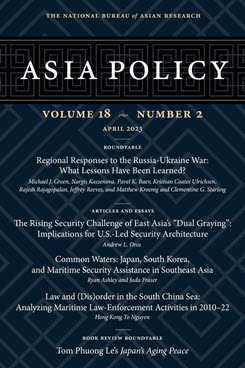Article in Asia Policy 18.2
Common Waters
Japan, South Korea, and Maritime Security Assistance in Southeast Asia
This article proposes that Southeast Asia is an ideal space for cooperation between Japan and South Korea, given that both countries share strategic priorities in the region.
EXECUTIVE SUMMARY
MAIN ARGUMENT
Although Japan and South Korea’s bilateral ties are typically defined by long-standing issues over historical issues and territorial disputes, each country shares a wide set of geopolitical interests, leading to an “Asian paradox” of mismatched priorities. This paradox is clearly visible in Southeast Asia. While Tokyo’s strategic ties with the subregion, often via the Association of Southeast Asian Nations (ASEAN), are deeper and predate Seoul’s, South Korea is increasingly expanding its own relations with the region alongside its growing security outreach across the Asia-Pacific. As a result, Japan’s and South Korea’s interests and activities are meeting in strategic spaces in Southeast Asia, such as the South China Sea and the Mekong River basin. Despite sharing common goals in these spaces, so far Seoul and Tokyo have not collaborated in their efforts. While many hurdles still limit direct security cooperation between Japan and South Korea, even indirect cooperation in shared strategic spaces in Southeast Asia could provide both countries an opportunity to build trust and provide security benefits to countries in Southeast Asia.
POLICY IMPLICATIONS
- The U.S. can incentivize Japan–South Korea cooperation in Southeast Asia through the Quad Plus framework.
- Expanding the General Security of Military Information Agreement between Japan and South Korea could be a method of increasing their cooperation in Southeast Asia.
- To achieve greater cooperation toward these aims, the U.S. should support strategic latitude for Japan and South Korea in Southeast Asia.
Ryan Ashley is an active duty U.S. Air Force officer and a PhD student at the University of Texas at Austin’s Lyndon B. Johnson School of Public Affairs (United States). He is a Graduate Fellow at the Clements Center for National Security and a Lecturer with the Air Force Special Operations School, where he teaches courses on Japanese politics, culture, and security. His work has been published by Nikkei Asia, Pacific Affairs, and War on the Rocks.
Jada Fraser is an MA student in Asian Studies in the Edmund A. Walsh School of Foreign Service at Georgetown University and Editor-in-Chief of the Georgetown Journal of Asian Affairs (United States). She is a member of the Young Leaders Program and a U.S.-Japan Next Generation Fellow with Pacific Forum. She has worked as a policy research fellow at the Edwin O. Reischauer Center for East Asian Studies at the Johns Hopkins School of Advanced International Studies and as a research assistant for the Japan chair at the Center for Strategic and International Studies. Her work has been published by Nikkei Asia, the Lowy Institute, and the Australian Strategic Policy Institute.
About Asia Policy
Asia Policy is a peer-reviewed scholarly journal presenting policy-relevant academic research on the Asia-Pacific that draws clear and concise conclusions useful to today’s policymakers. Asia Policy is published quarterly in January, April, July, and October and accepts submissions on a rolling basis. Learn more


